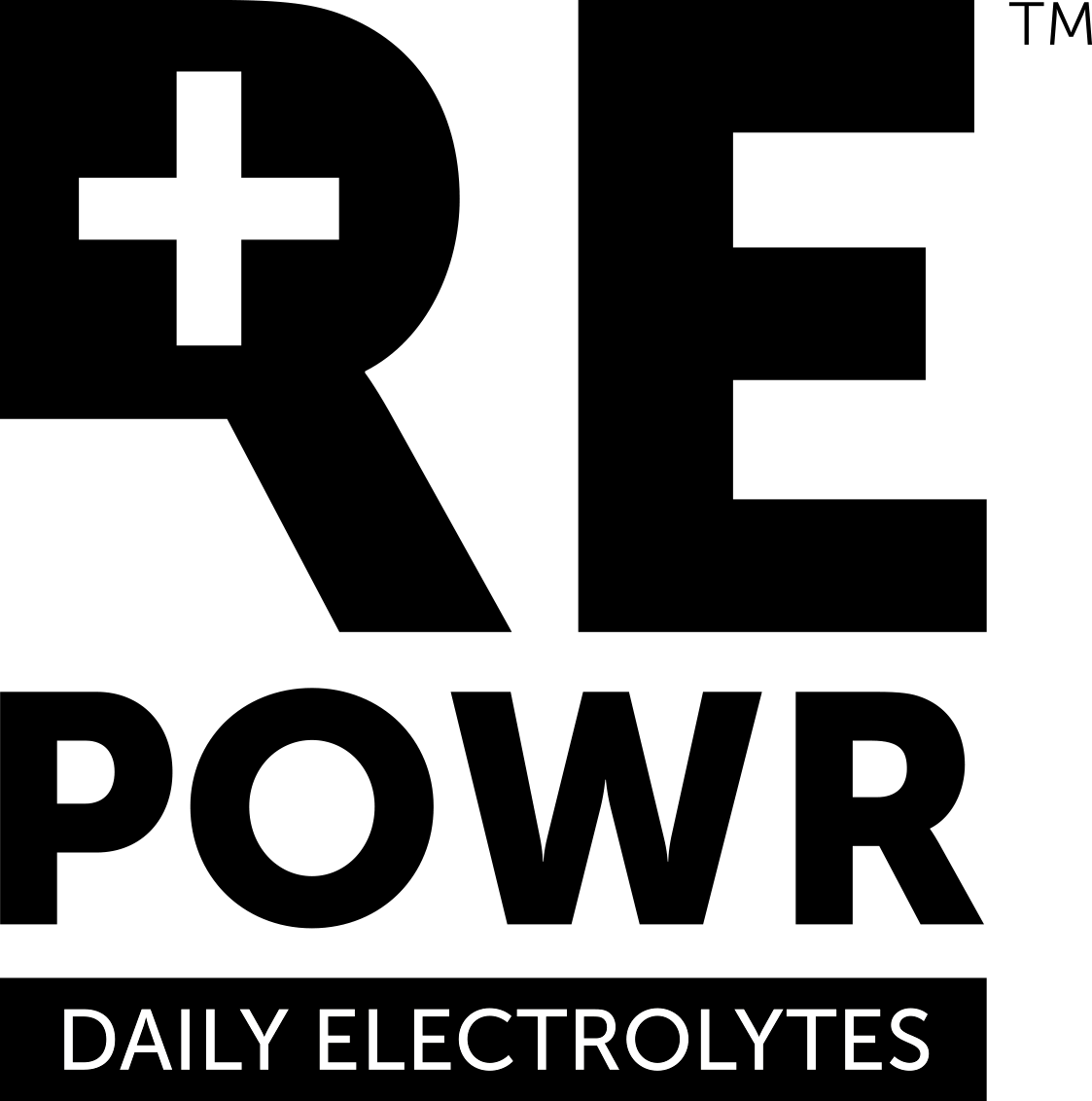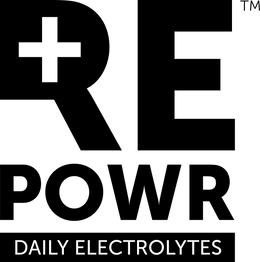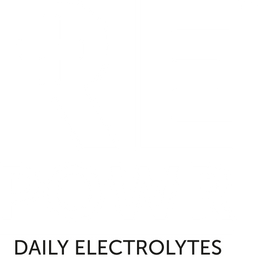The Science Behind REPOWR Daily Electrolytes
The Basics
Electrolytes are produced when essential minerals such as sodium, potassium, magnesium, calcium and chloride, are broken down into their ion form, meaning they carry an electrical charge that is necessary for our bodies to function, our nerves to fire and our muscles to contract. Electrolytes are also necessary for the movement of substances into and out of our cells.
Most electrolyte products have sodium and potassium, and some have magnesium. REPOWR has all three, in the optimal quantities and ratio.
What about chloride? Chloride (which carries a negative charge) comes attached to sodium, and usually potassium, as in sodium chloride or potassium chloride. Calcium doesn't need to be supplemented.
Let’s talk about sodium. This is the main electrolyte found in extracellular fluid, meaning fluid outside your cells, like in your blood. Out of all the electrolytes, sodium is lost in the greatest quantity (think of sweat) and needs the most replacement.
However, for the longest time, sodium, which comes from salt, has been vilified. Excess salt, we were told, raises blood pressure, increasing the risk of cardiovascular disease.
Things have changed. Yet, despite ample science debunking the myth that salt is bad for everyone, many people, including medical professionals, are still locked in the past. Old dogma doesn’t die easily.
An often-quoted study, published in 2011 in the prestigious Journal of the American Medical Association (JAMA) shows that our official guidelines for sodium are out of whack. If reading scientific papers isn’t your thing, there are 3 important takeaways:
- Too LITTLE salt is actually dangerous.
- Too much salt occurs at more than 8g of sodium per day (that’s 21g of salt)
- The sweet-spot, or lowest risk of cardiovascular disease, is 5g of sodium per day (13g of salt), more than DOUBLE the official recommendation.
* Importantly, sodium is not the same as the salt. Regular salt - the stuff we sprinkle onto our food - is sodium chloride (NaCl). The amount of sodium in sodium chloride is about 38%. So, to get 5g of sodium, you need to consume 13g of salt. This is a critical point often lost on people who aren’t doing chemistry for a living.
For an in-depth look at salt, The Salt Fix, by Dr James DiNicolantonio, provides an extensively researched view on why we can erase our guilt for this important mineral. For something shorter than a whole book, here is an excellent article by Dr Jason Fung, called The Truth About Salt, from the always reliable Diet Doctor website.
Now, if salt is ok for unhealthy folks, what about healthy people? After all, the above JAMA study was done on people at HIGH risk for cardiovascular disease. Are the needs of health-conscious people different from the average couch potato? It turns out the answer is YES, and that’s where REPOWR comes in.
REPOWR Daily Electrolytes has been designed for active, health-conscious people.
Electrolytes and Low Carb
Two of the world's foremost researchers in this field are Dr Steve Phinney and Prof Jeff Volek. Their book, “The Art and Science of Low Carbohydrate Living” is a bible, filled with scientific references and advice. It is the gold standard. Phinney and Volek have over 50 years of clinical experience and have published 200+ research papers and book chapters between them. A more reliable source of information simply doesn’t exist.
What do Phinney and Volek say about electrolytes? In short, a Low Carb diet requires people to get more electrolytes than people eating a regular diet. Many other credible doctors and health professionals echo the same advice. You can refer to Dr Eric Berg’s popular video on YouTube or Dr Ken Berry's explanation of electrolytes for Low Carb.
Low Carb diets are diuretic in nature, resulting in more fluid loss from lower insulin levels and less glycogen storage. This is completely normal. However, along with this loss of water, comes the loss of electrolytes. These need constant, in other words, daily, replacement.
The second important reason lower carb eaters need electrolytes is that real food doesn't have a lot of sodium, it's not easy to get enough potassium and our soil has lost a lot of its magnesium. By avoiding processed food, which contains a ton of sodium, and eating real food, we are short of the mineral salts that become electrolytes.
Are you one of those people that needs electrolytes daily? Here's some guidance. A pretty standard definition of Low Carb is the consumption of less than 130g of total carbohydrates per day, including fibre. The average Joe or Jane, who isn't thinking much about nutrition, eats between 250g and 350g of total carbs per day. The less-than-130g per day definition encompasses quite a broad spectrum of carb consumption, from strict keto (under 30g per day), to more moderate (31g - 100g per day) to more liberal (101g - 130g per day).
The Low Carb range includes many paleo eaters, as well as people eating whole food, low sugar diets. Let's call them all "carb-conscious, real-food people". Basically, if you cut out processed food, keep sugar to a minimum and understand that whole grains aren't so healthy, you're probably in the bucket - you don't need to be a blueberry-munching, coconut-oil-guzzling purist. And if you're in the bucket, taking REPOWR will help you feel more energised and focused, and should alleviate headaches, fatigue and muscle cramps.
REPOWR is a convenient, tasty way to get your basic electrolytes and drink more water. Having said that, a single sachet of REPOWR isn't sufficient, on its own, to provide all your daily electrolytes if you're eating healthy. So, we suggest continuing to add salt liberally to your food, making sure you eat your leafy greens and other potassium-rich foods, and taking a magnesium supplement. Almost everyone is deficient in magnesium.
Newcomers to the lower carb way of life often find it takes time to adapt. The first week or three can leave you with headaches and other flu-like symptoms, known as carb-flu. Taking electrolytes is almost always the cure. In fact, it's often an instant cure. Carb-flu vanishes quickly with sufficient electrolytes.
REPOWR is a perfectly formulated electrolyte for lower carb, health-conscious diets.
Electrolytes and Intermittent Fasting
There are many different fasting regimes, from the popular 16:8 method to long multi-day fasts. Intermittent Fasting (IF) or Time Restricted Feeding (TRF) generally refers to a fast less than 24 hours. Then there are water-only fasts, fat fasts and fast-mimicking diets. Each has it's own protocol with different dos and don'ts.
One thing is common to all types of intermittent fasting - loss of water and electrolytes, and the need to replace those so you don't feel crappy. Our main source of electrolytes is food, which we aren't getting during a fast. The natural loss of electrolytes and the absence of food makes REPOWR an important tool for fasting well.
Mild headaches are common while fasting and muscle cramps can occur at night or towards the end of a fast. But perhaps more debilitating are the feelings of fatigue, lethargy and of course hunger pangs. Our brains are affected too. Difficulty focusing or concentrating is a theme. Often, these are symptoms of mild dehydration (loss of fluid and electrolytes). Sipping a big bottle of water with REPOWR Daily Electrolytes during your fast can alleviate these symptoms.
Most types of intermittent fasting require that you don't have calories during the fast. REPOWR is a zero calorie product making it perfect for these types of IF. REPOWR contains stevia, a natural, non-caloric sweetener that doesn’t increase your blood sugar or insulin levels. Nonetheless, some people on a strict fasting regimen (such as water-only) don’t want any sweetness or flavour during a fast. A good work-around is to consume REPOWR prior to, or after, your fast. Topping up electrolytes beforehand dovetails nicely with this study showing electrolyte loss occurs more rapidly at the beginning of a fast.
Thomas DeLauer, who has a huge social media following, provides an excellent overview of electrolyte science in the context of fasting in this 10 minute video and Dr Rhonda Patrick, a brilliant researcher, provides some quick answers on electrolytes in this 2 minute segment.
A word of caution. We recommend extra care before embarking on a multi-day fast - these are more stressful for the body and potentially dangerous for some people. Get advice from a healthcare professional, particularly if you take medication. Choose one carefully - find a professional who is supportive, knowledgeable and experienced with longer fasting.
Electrolytes and Exercise
When it comes to exercise and athletic performance the most important thing to remember is that hydration and energy are different animals. Hydration refers to your electrolyte and fluid status, and energy deals with "fuel" (or making ATP) which comes predominantly from glucose and fat.
Hydration
Sweating, particularly during long training sessions in hot weather, causes significant water loss, along with the loss of more electrolytes than usual, mainly sodium. You may have noticed the white stains on your cap or shirt from sweating – you can literally see and taste the salt.
Sodium is essential for maintaining blood volume and preventing hyponatremia, a serious condition caused by over-hydration, basically drinking too much plain water without replacing the lost sodium. REPOWR is designed to replace the actual sodium lost during exercise, one of the reasons it works so well. It contains 2x - 5x more sodium than other hydration products.
Sodium loss during exercise varies by individual, and by how much you sweat. However, the average sodium loss per hour of intensive exercise is 1,150mg. It's not hard to see that a product containing 200mg or 300mg of sodium isn't nearly enough. REPOWR is scientifically formulated to replace what you lose.
Loss of electrolytes leads to degradation of muscle and nerve performance, both of which rely on electrical signals. There is good science showing that muscle cramps are strongly associated with loss of sodium and repetitive contraction. Your heart needs electrolytes to maintain rhythm and keep pumping, and the billions of neurons in your brain are heavily reliant on electrolytes. Potassium helps muscles to contract and nerves to fire, and magnesium, particularly the malate form that is used in REPOWR, is important for ATP creation in our mitochondria and muscle relaxation.
REPOWR has the optimum amount and ratio of sodium, potassium and magnesium, packed into a convenient 6.1g sachet. It is easy to mix, easy to drink and tastes exceptional. REPOWR is also sensitive to your gastrointestinal tract. It's incredibly important for athletes to have a product that doesn't cause GI distress. How we digest and absorb nutrients under exertion is different compared to resting. We are proud of how well REPOWR is tolerated by athletes of all types. This is no accident. We've intentionally not used artificial sweeteners, sugar alcohols or other additives that could induce GI sensitivity.
Hydration should be considered before, during and post workout, with particular attention paid to longer efforts, higher intensities and hotter conditions. The more your demand of your body, the more important hydration becomes.
Little attention has been given to hydrating before exercise. This is called pre-hydration or preloading. See our super-interesting blog on using preloading to supercharge your athletic performance.
This paper deals with fluid and electrolyte replacement during training, competition and recovery. Replacement of electrolytes quickly is important for recovery after exercise.
An important note - REPOWR is NOT a clinical dehydration product. For serious dehydration, a therapeutic electrolyte with glucose is recommended based on oral rehydration therapy or ORT. REPOWR has no glucose and is not an ORT product.
Fuel (Fat vs Glucose)
A big part of athletic performance concerns how your body uses fuel to create energy. However, for various reasons, hydration has become intertwined with energy, although they are totally different systems. As a result, most hydration products are laden with glucose or sugar in one form or another. This is a big mistake. Yes, electrolytes are absorbed quickly with glucose, but glucose isn't required and the inclusion of glucose has negative consequences. We need to think about these two different systems separately, then optimize both. We dealt with hydration in the section above. Let's talk more about energy.
Our bodies create energy primarily from fat and glucose. Glucose is stored in our liver and muscles as glycogen, or consumed via food. Fat is stored in our adipose tissue. The athletic community has traditionally been preoccupied with glucose, which is why so many sugary gels and goos and sports drinks exist. But there is a growing understanding among the scientific community and elite athletes that utilising fat more efficiently is the key to increased performance. This doesn't mean ignoring glucose, but it means a more nuanced understanding of how energy is created and used, so we get the fuel balance right.
Fat oxidation is the scientific term for burning fat. Training in a fasted state, encourages your body to burn more fat and increases its ability to burn fat. Not only does this approach help with weight management – we want to burn as much fat as possible – but it also makes better use of your larger fuel tank (fat stores) and spares your much smaller, precious glucose for when it's needed most. (See this Training Peaks article on Dr Peter Attia’s approach).
Think of it like this – your body has about 2,000 calories of stored glucose fuel (enough for about 2 hours of intensive effort) yet it has tens of thousands of calories of fat fuel, enough for many weeks of effort! Even a lean person has dollops of stored body fat. Glucose should be seen as the quick burning fuel with limited supply; fat is the slow burning fuel with almost unlimited supply.
This excellent tweet by Dr Ted Naiman puts it in perspective.

So, why do we want to prioritise fat as our main fuel? Because:
- It helps us lose weight (article on Chris Froome).
- It won’t run out.
- It allows us to save glucose for the later part of an event or training session or when higher intensity is needed.
- Fat is a “cleaner” fuel, meaning it results in less oxidative stress and cellular damage.
What’s really important to understand is that the food and drink we consume has a profound effect on the fuel we use for energy. There is one key principle to remember: consuming glucose shuts off fat oxidation (study reference here, Dr Ted Naiman explanation here and graphic below). This means that as soon as we eat or drink something with glucose, our bodies prioritise the incoming fuel and we stop burning fat.

The magic of REPOWR is that it provides the electrolytes and hydration an athlete needs, without any glucose. This promotes maximum fat oxidation, allowing glucose (from our own glycogen stores) to be conserved for later use.
We are not saying that glucose shouldn't be used during an athletic event. We are saying that glucose should be kept out of hydration. This way, you get the water and electrolytes you need, without being forced to consume energy. It allows you to maximise fat burning (because consuming glucose shuts off fat). You then have the choice of how and when to use glucose, and to use real food (bananas, dates, natural energy bars) instead of sugary goo. Use glucose strategically, as and when you need it, in the form you prefer. You don't always need glucose. You do always need hydration. That's the REPOWR difference.
There is one more benefit to avoiding glucose with your hydration. An important one. REPOWR promotes overall metabolic health. Why? Because by avoiding glucose in your hydration drink, you are helping to keep your blood sugar constant and prevent blood sugar spikes that occur every time you consume a glucose-rich product. Over the long term, your blood vessels, organs and particularly your brain, will thank you.
Many chronic diseases have a metabolic origin. In very simple terms this means glucose and insulin become “dysregulated”. By avoiding glucose and sugar as much as possible, you’re promoting your overall health. And isn’t that the reason you exercise in the first place?
(See Sami Inkinen’s amazing story)
Disclaimer
All content and references on this website are strictly for informational purposes and should not be construed as medical, nutritional or health advice. Please seek the advice of a healthcare professional before changing your diet, embarking on any type of fasting regime, or consuming supplements or electrolytes. This is particularly important if you take medication or have a chronic health condition.





